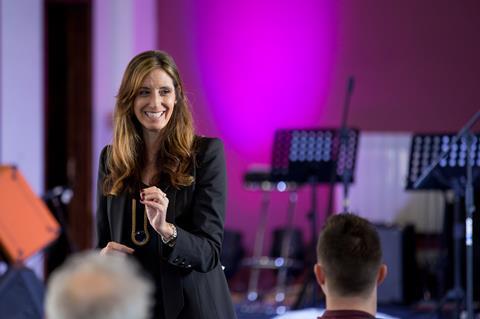Dr Tania Harris on how God told her clearly to not let her singleness stop her from doing all that he had called her to do

In May 2000, God called me to plant a church. He had spoken clearly; all the preparations were complete, and the first service had been scheduled. It should have been a time of celebration – my ‘moment of destiny’ and the call I’d been trained for! But it wasn’t. Even though God had spoken, I knew I couldn’t do it. I knew what God was calling me to was impossible because I didn’t have the one thing I needed most.
A husband.
And everyone knew you need a husband to plant a church.
Knowing I was ill-equipped
I knew it because I’d seen in at pastors’ conferences. Those times when we’d celebrate the success of a new church – and the pastor would walk up to the platform with his wife and talk about what God had done. He’d smile and wrap his arm around the woman beside him and say: “Of course, I couldn’t do it without her.”
I knew it because of the weddings I’d been to. That moment in the ceremony when the minister would stand before the bride and groom and read a Bible passage such as Ecclesiastes 4:9–10: “Two are better than one…If either of them falls down, one can help the other up. But pity anyone who falls and has no one to pick them up.” And everyone would nod their heads in agreement.
I had grown up believing that my purpose in life would come with marriage and I couldn’t function fully without it
I knew it too because of the textbook I’d read at Bible college. The one that was written by our denominational experts and was prescribed reading for students and would-be church planters. There in the first chapter was a list of ‘Essentials’ – items like a sum of money, a team, a suitable venue – but topping the list: “A pastor and his wife.”
I told God all of this. I told him about the absence of single pastors in our denomination and the Bible college textbook. I even told him about the scriptures he’d inspired. But he didn’t seem to notice. When I asked him about marriage, his only words were “not yet”.
It stood to reason that I was upset. It made sense that I called God “unfair”. This project had the mark of failure stamped all over it. My new church was to be in St Kilda – the red-light district of my city. This was an area known to be particularly tough – where drunks interrupted the Sunday service and pastoral calls came in from lonely men at 2am. What’s more, this was not your normal pioneering situation. A church had died and I was to start it all over again.
There was no money. My ‘team’ was a remnant of people who had already suffered too much disappointment. And it wasn’t like I had experience: I may have been involved in different ministries over the years, but I’d never planted a church.
So why would God ask me to do it on my own?
Laying down the old-fashioned way
I still remember the moment God answered my question. I was driving to work one morning when a clear picture came into my mind. It was a vision of a penny farthing bicycle; one of those 19th-century types with an enormous wheel at the front and a tiny wheel at the back. Then I distinctly heard the words: “That’s the old-fashioned way.”
I knew instantly it was God and I knew exactly what it meant. I knew if I married then, my husband would become the “big wheel” at the front and I would be the “small wheel” at the back. I also knew without a shadow of a doubt, that unless I did what God was asking, it would stay that way. The problem was I had grown up believing that my purpose in life would come with marriage and I couldn’t function fully without it.
Everything I had learnt in my conservative upbringing had socialised me into believing that I was incomplete and ill-equipped without a husband. That made my single status an obstacle to living out the call of God on my life. Now God was asking me to deal with my doubts and fears and believe him instead. Effectively, God was calling me to grow up.
The impact of the curse
The desire to be married – to love and be loved – is a God-given one. It’s part of our humanity. Being alone was the only thing that wasn’t good about God’s creation (Genesis 2:18). It was God himself who said aloneness is not good – and marriage was his solution.
At the same time, the curse of sin means that our need for a romantic partner can become distorted. The curse, as described in the early pages of Genesis, has had a devastating impact on women. Although the precise meaning of Genesis 3:16: “your desire will be for your husband” is hotly debated by scholars, it’s clear that this desire is an unhealthy one – a curse that has been reversed by the cross (Galatians 3:13).
I now fully express my skills and gifts to serve God, irrespective of my marital status
However, the curse still lingers in our world today wherever Christ’s work isn’t fully embraced. There’s a reason why women obsess about finding a man and why men settle for a woman who isn’t their peer. It’s the same reason that led me to think I couldn’t fully function without a husband or why I thought I was any less capable than a man would be.
Becoming a big wheel
The ‘God-conversation’ in my car that day effectively silenced all my protests. I made a decision to follow the leading of the Spirit and trust God for the outcome. It wasn’t easy, but my church planting experience turned out to be the most defining season of my life. God provided for me time and time again. Resources, finances and, importantly, people to pick me up when I fell down. I discovered gifts and skills I never knew I had. I learnt that I could do it without a husband, but I couldn’t do it without God.
Since then, God has led me to start a different ministry that ministers to people globally. The confidence to write, study and speak in churches and conferences all round the world stems from my decision to continually heed the voice of the Spirit.
Living as a ‘big wheel’ means that I now fully express my skills and gifts to serve God, irrespective of my marital status. I may still have lonely nights, the frustration of finding a plus-one for a big event or a reliable flatmate, but it doesn’t mean I can fulfil God’s purpose for my life any less.
God’s vision of ‘equal wheels’ that was established at the beginning (Genesis 1:27-28) applies to all of us today. His ideal of partnership – two equal wheels working together where one does not diminish the other – means that both men and women are needed to move the kingdom forward. Whether married, single, divorced or widowed, we can all fully embrace the purpose God created us for.
































No comments yet